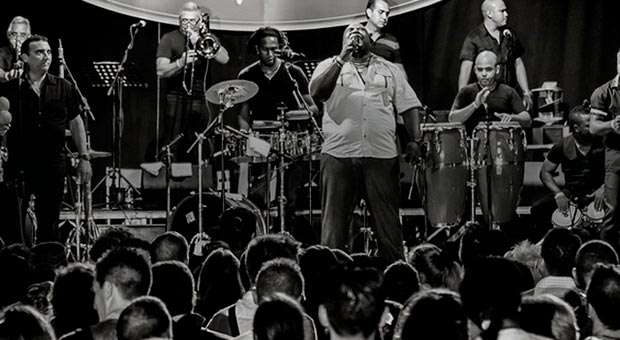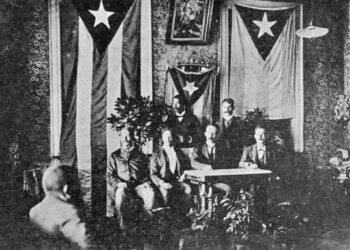“Me dicen Cuba” (people call me Cuba) is perhaps one of Alexander Abreu’s most popular lines. He really knows how to portray the Cuban identity from the first notes of his musical proposals, and rhythms, very close to his origins, reveal a strong desire for playing timba, Cuban salsa, even when there is more room for other genres in fashion.
Since the first performance of his band Havana D’Primera in October, 2008, in the Turquino Cabaret at the Habana Libre Hotel, they have struggle to be an authentic exponent of Cuban music within this market, which is very competitive and constantly changing.
I statements to OnCuba, the director of Havana D’Primera talked about the beginnings of the band, their objectives and plans.
Recently, the Cuban journal Juventud Rebelde described Havana D’Primera as the most popular band in Cuba. What do you think about that?
I’m grateful for that comment but I think that being the most popular band in Cuba is really difficult if taken into account the kind of music we do and the music people is actually listening to, the music that is playing nationwide. Cuba is a tough scenario in terms of music: there are genres that are gaining spaces and bands represent it properly. For instance, reggaeton continues to be in the preference of many and there are bands like Gente de Zona or Los Cuatro that have accomplished national and international success. However, I cannot complain and I must acknowledge Havana D’Primera is in a good position though it insists on salsa as genre.
In your opinion, what has kept Havana D´Primerain the preference of the Cuban audience in a context where salsa has left room for other genres?
Havana D´Primera emerged in a special moment of the Cuban music: a moment where important Cuban creators were a bit disoriented, making featurings with reggaeton musicians and changing the style for being more commercial in and out of Cuba. For instance, Isaac Delgado had left from Cuba and there were few salsa figures in the island. We resisted that reality and started to work based on the music from the 90’s, when salsa and timba were at the top. We were certain that special moment could be reawakened and we made it with this new proposal.
Successfully
I think yes. I’m sure that success is largely the result of the lyrics with positive messages and the harmonious fusion of genres like jazz and pop, in addition to the richness of Cuban rhythms and the energy over the stage.
How do you manage to direct, write, arrange… all together?
It is not hard for me because the music flows and you can do it all when you feel then need to share it. I have a wonderful band that makes it easy to create a special moment and I have exceptionally good musicians, the best ones in Cuba. As a result of our joint work we can create tempting and substantial proposals for the audience of this kind of music.
What’s the hardest thing to do when directing a band like Havana D’Primera?
The hardest is to reach the consensus of all the members of the band. We are about 300 people with different ways of thinking. Intertwining all moods and spending a considerable part of the day together is hard. Yet, we try to make it work when presenting our music on a stage.
To what extent your experiences in previous band have contributed with the work you do now?
Those experiences have been really valuable, it is everything. For instance, during the seven years I spent with Paulo FG I learned a lot. I have to highlight the contributions to my career by Juan Manuel Ceruto, with whom I produced two of the albums of the band. I also learned a lot from Yoel Páez, Julio Montalvo and many others. I have the fortune of working with Rogelio Nápoles in the band. My background as trumpet player has allowed me to create a different product.
Haciendo historia and Pasaportea re two albums by Havana D´Primerathat represent the band’s total success…
I agree: Haciendo historia is an exhibition album; it shows the awakening of the band and the need of a musical proposal for Cuba and the world. We tried to produce a varied and comprehensive album so that the audience could notice the band’s desire to be heard.
Pasaporte is more serious and elaborate; it shows the maturity of the band and me as singer and composer. In general, its objectives were met.
What´s your opinion of the salsa and timba produced in Cuba today?
To be honest I have to say I don’t feel much identified with what is done today. This is a moment with lots of musical aggressiveness, lyrics are very violent. They are not about love, life, women, nature, and daily life. I’m convinced the first and most important purpose of music is to transmit joy and that’s not what we see. I’m sad for the violence I sense in the current Cuban music.
In this regard, would you say Havana D´Primera is making the difference?
Yes, I think we are. I believe that in the future, with our work and the work by other bands that have been defending the best of our music, we would be able to change this current trend. There are bands that can defend the Cuban music very well like Van Van, Pupy y los que son son, or Adalberto Álvarez y su son. There are new good bands as well such as El niño y la verdad, or Juan Guillermo’s band.
Are you thinking on a third album?
Yes, we are working on our third album by the name of La vuelta al mundo. We are taking some time to choose the tracks correctly and start recording. We want it to be a nice and clean production for the audience of this genre. I still think our band is at its 50%, it still has a lot to give for reaching a greater audience.
One of your songs has been a success this summer: Me dicen Cuba (people call me Cuba). At some point in the lyric of the song you say: Cubano pa´lante (Cubans keep on moving forward). What’s the intended message?
My message is about persevering and struggling against difficulties. Sometimes it is hard to live in and out of Cuba, but we have to keep on and never stop. I lived four years in Denmark and I really missed my country. That phrase means we cannot lose our strength, energy, charisma, the urge to move forward, because it is always possible to give more. So the message for all Cubans is: Cubans keep on moving forward!










